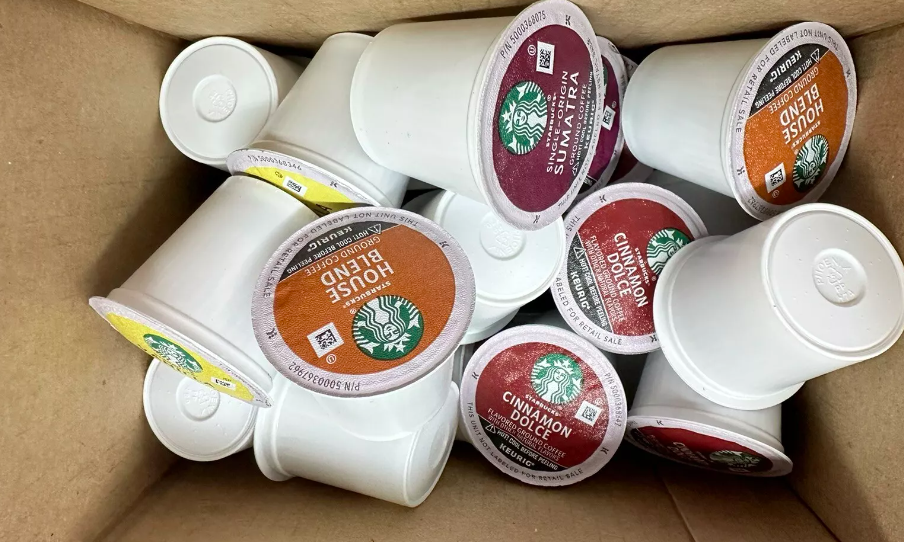Have you ever wondered how much caffeine is in your morning K-Cup coffee? Whether you’re a coffee enthusiast or someone who relies on a daily cup to power through your day, understanding how much caffeine is in your K-Cup can help you make informed choices. If you’re trying to moderate your caffeine intake or simply want to know what you’re drinking, you’re in the right place! In this post, we’ll dive deep into the caffeine content in K-Cups, explore factors affecting caffeine levels, and offer tips for finding the perfect balance for your coffee preferences.
What Is a K-Cup?

Before we dive into the specifics of caffeine content, it’s important to understand what a K-Cup is. A K-Cup is a single-serve coffee pod designed for Keurig coffee makers. Each pod contains pre-measured ground coffee, sealed to preserve freshness, and is designed for easy use with a Keurig machine.
The main appeal of K-Cups lies in their convenience, you can quickly brew a single cup of coffee without the mess or time commitment of traditional brewing methods. But when it comes to caffeine content, not all K-Cups are created equal. Factors such as the coffee blend, brewing method, and pod size can influence how much caffeine you get with each cup.
See more: The Ultimate Guide to Grind Coffee Beans for Perfect Coffee
How Much Caffeine in K Cup?
The caffeine content in a typical K-Cup ranges from 75 to 150 milligrams per 8-ounce cup, depending on the coffee variety and the specific brand of K-Cup. The amount of caffeine can vary significantly based on several factors, including:
- Type of coffee: Different coffee beans have varying amounts of caffeine. Arabica beans generally contain less caffeine compared to Robusta beans.
- Roast level: Lighter roasts tend to have slightly more caffeine by weight compared to darker roasts, as the roasting process can decrease caffeine levels.
- Brewing strength: The longer you brew your coffee, the more caffeine will be extracted from the grounds. Keurig machines use different settings, and some models may allow you to adjust the brew strength.
To make it easier, here’s a table summarizing the general caffeine range in different types of K-Cups:
| K-Cup Type | Caffeine Content (mg) | Example Brand |
|---|---|---|
| Light Roast | 100-150 mg | Green Mountain Coffee |
| Medium Roast | 75-100 mg | Dunkin’ K-Cups |
| Dark Roast | 60-90 mg | Starbucks K-Cups |
| Decaffeinated | 2-5 mg | Swiss Water Process |
While the average caffeine content per cup varies, the general rule is that lighter roasts will generally have more caffeine compared to dark roasts. However, this can be influenced by other factors, such as the coffee variety or brewing method.
Factors Affecting Caffeine Content in K-Cups
Several factors play a role in determining how much caffeine is in your K-Cup coffee. Understanding these variables can help you choose a K-Cup that fits your caffeine preferences.
1. Coffee Bean Type
The variety of coffee bean used plays a huge role in the caffeine content of a K-Cup. As mentioned earlier, Arabica beans have less caffeine compared to Robusta beans, which tend to pack more punch. Many coffee brands blend these two varieties to achieve the desired taste profile and caffeine balance.
2. Coffee Roast Level
Roast level can influence the caffeine content by weight. Lighter roasts retain more caffeine because they undergo less chemical change during the roasting process, while darker roasts lose more caffeine as they cook longer. However, by volume, darker roasts may seem stronger due to the more intense flavor.
3. Brewing Strength
If you’re using a Keurig machine that allows you to adjust the brew strength, it’s important to know that stronger settings can lead to more caffeine being extracted from the coffee grounds. The more finely ground the coffee, the more caffeine can be extracted during the brewing process.
4. K-Cup Size
Some brands offer K-Cups in different sizes or strengths, such as “extra bold” versions, which contain more coffee grounds than standard K-Cups. These larger or more concentrated K-Cups can result in higher caffeine content.
Popular K-Cup Brands and Their Caffeine Content
If you’re looking for a specific amount of caffeine in your K-Cup, certain brands and varieties are known for their high caffeine content. Here’s a breakdown of some popular K-Cup brands and the average caffeine levels they offer:
| K-Cup Brand | Caffeine Content (mg) | Notable Features |
|---|---|---|
| Death Wish Coffee | 300 mg | Known for being “the world’s strongest coffee” |
| Green Mountain Coffee | 120 mg | Organic, fair trade options |
| Starbucks Pike Place | 130 mg | Medium roast with balanced flavor |
| Dunkin’ Original Blend | 95 mg | Popular and smooth tasting |
If you’re looking for an extra boost, Death Wish Coffee is a great option, boasting a high caffeine content per K-Cup. However, it might be a bit too strong for those who prefer a more moderate coffee experience.
How to Control Your Caffeine Intake
If you’re conscious about how much caffeine you consume, there are a few ways to control your intake when using K-Cups:
- Choose lighter roasts: As lighter roasts retain more caffeine, they are a good option for those who want an extra energy boost.
- Go for decaffeinated options: Decaf K-Cups are available and typically contain only a small amount of caffeine, so they’re perfect if you want to limit your intake.
- Adjust brewing strength: If your Keurig allows it, adjusting the brew strength can give you more control over how strong your coffee is, and subsequently, how much caffeine is in your cup.
By being mindful of these factors, you can enjoy a cup of coffee that suits your taste and caffeine needs.
Conclusion
When it comes to understanding how much caffeine is in a K-Cup, there are several factors to consider, such as the type of coffee, roast level, brewing strength, and K-Cup size. On average, a standard K-Cup contains around 75 to 150 milligrams of caffeine, but this can vary depending on the brand and coffee variety.

I’m Kara Chavez, and I love coffee. I like to create some of the best coffees around – espressos, lattes, macchiatos . I strive for perfection in my coffee-making skills, and I take great pride in providing a delicious cup of joe to my customers.
I’ve been working in the coffee industry for years now, and I know everything there is to know about making a perfect cup of coffee. My passion for coffee shines through in every cup that I make, and I hope that you’ll stop by soon so that I can share my love of coffee with you!

